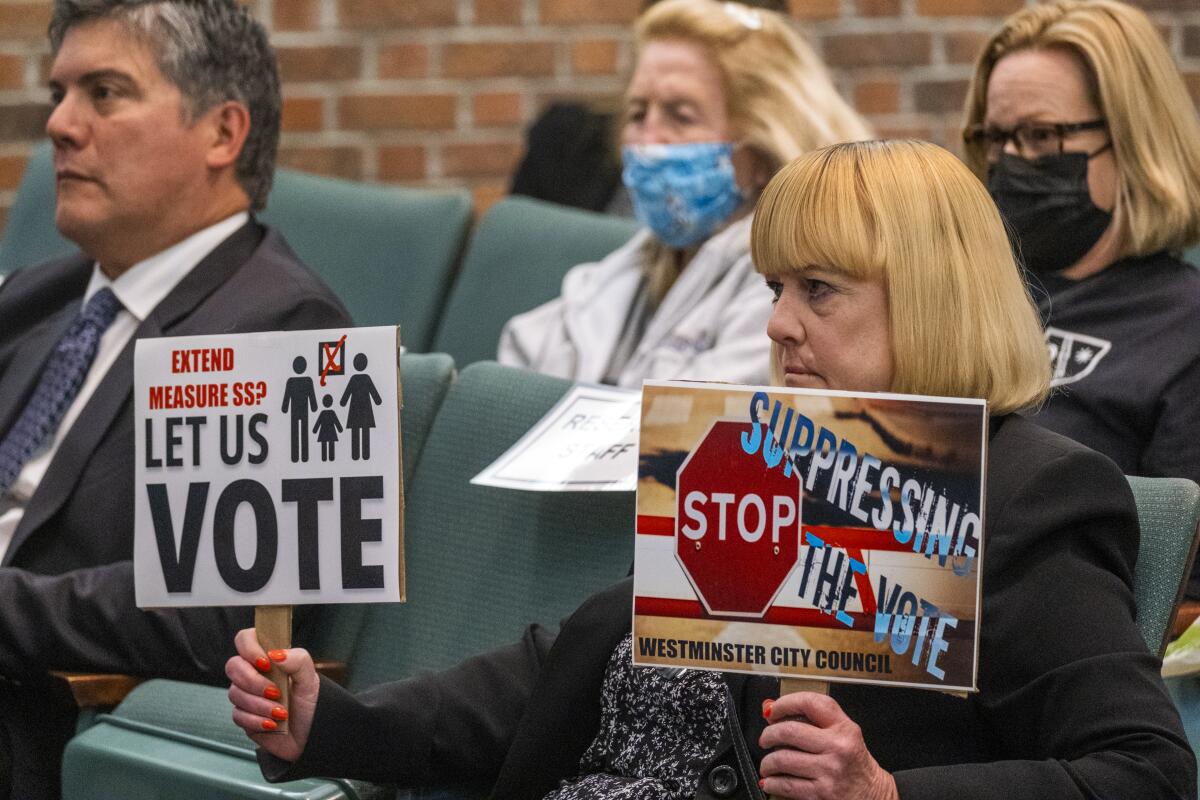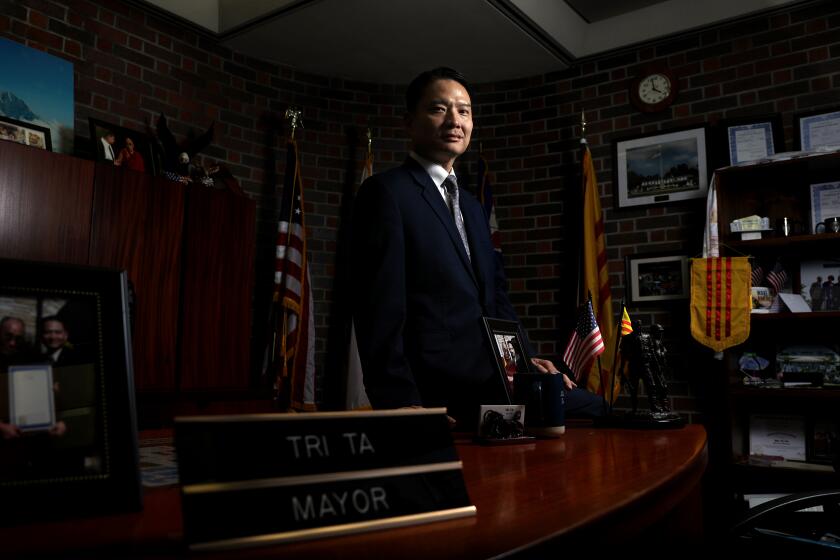As financial collapse looms, Westminster puts tax measure on November ballot

The extension of a sales tax that has been credited with keeping Westminster financially afloat moved forward after residents chided city officials for years of indecision.
On Friday, four of five City Council members agreed to place a measure on the November ballot asking voters to renew the 1% sales tax for the next 20 years.
The sales tax, called Measure SS, has brought in $81.5 million since it first passed in 2016. Money from the tax makes up roughly a quarter of the cityâs operating budget, funding staff and city services. If voters do not approve its extension, it will sunset on Dec. 31.
The deadline to place items on the ballot was 5 p.m. Friday. Without the tax, the city is projected to go bankrupt by 2024, even with drastic cuts.
Those cuts would likely result in closed parks, unpaved streets and the elimination of youth and senior programs, as well as staff layoffs, including a 33% reduction to the police force in a city that has been running on thin staffing for years, said City Manager Christine Cordon.
In Westminster, home to Little Saigon, the election of a majority-Vietnamese council in 2008 was a milestone. The bickering started almost immediately and hasnât stopped since.
In May, the City Council voted unanimously to approve 10% raises for many city employees beginning July 1, amounting to a budget increase of $2.7 million in the next year. Officials say the raises were a necessary step to retain staff who are concerned about the cityâs finances and leaving for better-paying jobs elsewhere.
On Friday, Mayor Tri Ta, Vice Mayor Carlos Manzo and Councilmembers Kimberly Ho and Chi Charlie Nguyen voted in favor of placing the sales tax on the ballot. Councilman Tai Do abstained.
Earlier in the week, the tax seemed doomed, with four votes needed to put it on the ballot and only Manzo and Ho in favor.
âResidents know what is at stake,â Manzo said at a meeting that stretched into early Thursday morning. âThey have a right to vote if our parks are going to continue to be maintained. They have a right to vote if our senior services are going to be cut. We must do what we were elected to do â protect our residents and put their needs before our political ambitions.â
Ho said she believes residents should vote on the issue. She noted the possible cuts to public safety services, adding that police officers are already transferring to other cities because of Westminsterâs uncertain finances.
The council decided to meet again the next day to make a final decision.
At Fridayâs meeting, Ta and Nguyen said they changed their positions after hearing from residents. Ta said he would only support placing the tax on the ballot if there was a 20-year sunset.
In Westminster, a city of more than 90,000 that is home to Little Saigon, the election of a majority-Vietnamese council more than a decade ago was a proud milestone.
But in recent years, public meetings have been punctuated by squabbling among City Council members.
The Westminster City Councilâs Vietnamese American majority, the first in the nation, threatens to implode amid drama that has spurred recall efforts against all five members.
âThey fight so much, and thatâs the reason weâre where we are,â said Diana Carey, a former council member who heads a citizens committee overseeing the sales tax. âTheyâre afraid to vote on anything substantive because they feel that the other people on the council will use it against them. But weâve got to keep the lights on here.â
A survey of Westminster residents in 2020 found widespread support for the sales tax, with 60% in favor of renewal, 29% against and 11% undecided.
During roughly four hours of public comment over the course of the two meetings this week, dozens of residents spoke in favor of extending the tax measure.
On Friday, their fears about the future of the city turned to anger at council members who had declined to take a position.
âYou work for us,â said resident Roger Mindrum. âWhat you did by not voting for this and abstaining is pure cowardice. Youâre acting like tyrants, and youâre turning the city into a mockery.â
The cityâs precarious finances are not entirely the fault of the current council. Proposition 13, passed by California voters in 1978, locked Westminster into lower-than-average property tax returns. The groundwork for the financial problems was also laid decades ago as a result of an overreliance on state redevelopment funds.
Ta, who is running for state Assembly, said that when he voted for the sales tax six years ago, he never intended it to be a permanent solution.
City staffers have proposed other ideas to generate revenue, including annexing unincorporated county land in Westminster, electronic billboards, opening a city gas station and establishing vendor kiosks at the Civic Center. The council has not moved forward on those proposals.
Do, who is running for mayor against Nguyen, said voters approved the tax the first time with the understanding that the council would help transform the cityâs finances. But, he said, ânothing got done.â
âI have no stomach to ask the taxpayers to continue to give us more money so we can continue more infighting,â he said.
More to Read
Sign up for Essential California
The most important California stories and recommendations in your inbox every morning.
You may occasionally receive promotional content from the Los Angeles Times.













